Salmonella Typhi IgG / IgM Fast Test
1/39
There's no tags or description
Looks like no tags are added yet.
Name | Mastery | Learn | Test | Matching | Spaced |
|---|
No study sessions yet.
40 Terms
Typhoid Fever
A serious illness caused by bacteria called Salmonella typhi.
Salmonella Typhi are shred in the urine or stool of infected people, including chronic carriers
Salmonella Typhi are shred in the - of infected people, including chronic carriers
Salmonella Typhi have no known animal reservoirs for typhoid fever.
Salmonella Typhi have known animal reservoirs for typhoid fever. (t/f)
• Eating / Drinking contaminated food or water
• Direct contact with fecal material from infected individuals
Mode of Transmission of Salmonella Typhi IgG / IgM Fast Test
• Fever
• Headache
• Loss of appetite
• Constipation or diarrhea
• Non-productive cough
Symptoms (Mild to Moderate) of Salmonella Typhi
• Symptoms may appear 3 days to 3 months (depending on the number of bacteria ingested), but onset of illness usually occurs 1-3 weeks after the exposure.
Rationale of Salmonella Typhi
• Symptoms may appear - (depending on the number of bacteria ingested), but onset of illness usually occurs - after the exposure.
Rationale of Salmonella Typhi
• The time period that a person can have Salmonella typhi in their stool is variable. About 10% of untreated patients may shed infectious bacteria in their stool up to 3 months after onset of symptoms & 2–5% may become permanent shedders. These permanent shedders are called chronic carriers.
Rationale of Salmonella Typhi
• The time period that a person can have Salmonella typhi in their stool is variable. About -% of untreated patients may shed infectious bacteria in their stool up to - months after onset of symptoms & 2–5% may become permanent shedders. These permanent shedders are called chronic carriers.
Rationale of Salmonella Typhi
• The time period that a person can have Salmonella typhi in their stool is variable. About 10% of untreated patients may shed infectious bacteria in their stool up to 3 months after onset of symptoms & 2–5% may become permanent shedders. These permanent shedders are called chronic carriers.
Rationale of Salmonella Typhi
• The time period that a person can have Salmonella typhi in their stool is variable. About 10% of untreated patients may shed infectious bacteria in their stool up to 3 months after onset of symptoms & -% may become permanent shedders. These permanent shedders are called -.
T
Principle of Salmonella Typhi (t/f)
• Salmonella typhi IgG/IgM Fast test is design to simultaneously detect & differentiate IgG & IgM antibodies to Salmonella & differentiate IgG & IgM antibodies to Salmonella typhi in human serum, plasma or whole blood.
human serum
plasma
whole blood
Principle of Salmonella Typhi
• Salmonella typhi IgG/IgM Fast test is design to simultaneously detect & differentiate IgG & IgM antibodies to Salmonella & differentiate IgG & IgM antibodies to Salmonella typhi in -
• Salmonella typhi IgG/IgM Fast test has 3 pre-coated lines, “G” (test line for Salmonella typhi IgG), “M” (test line for Salmonella typhi IgM), & “C” (control line) on the surface of the strip.
Principle of Salmonella Typhi
• Salmonella typhi IgG/IgM Fast test has 3 pre-coated lines, “-” (test line for Salmonella typhi IgG), “-” (test line for Salmonella typhi IgM), & “-” (control line) on the surface of the strip.
• Salmonella typhi IgG/IgM Fast test has 3 pre-coated lines, “G” (test line for Salmonella typhi IgG), “M” (test line for Salmonella typhi IgM), & “C” (control line) on the surface of the strip.
Principle of Salmonella Typhi
• Salmonella typhi IgG/IgM Fast test has 3 pre-coated lines, “G” (test line for Salmonella typhi IgG), “M” (test line for Salmonella typhi IgM), & “C” (control line) on the - of the strip.
F
• Neither the test line nor the control line is visible in the result window before applying a sample.
Principle of Salmonella Typhi (t/f)
• Neither the test line nor the control line is not visible in the result window before applying a sample.
Control line
Principle of Salmonella Typhi
what is used for procedural control & should always appear if the test procedure performed properly & the test reagents of the control line are working.
F
• 2 colored lines (“G”, “M”) will be visible in the result window if there are enough IgG and/or IgM antibodies to Salmonella typhi in the sample.
Principle of Salmonella Typhi (t/f)
• 2 colored lines (“G”, “M”) will not be visible in the result window if there are enough IgG and/or IgM antibodies to Salmonella typhi in the sample.
T
Principle of Salmonella Typhi
• If IgG or IgM antibodies to Salmonella typhi are not present in the sample, no color appears in “G” &/or “M”.
Principle of Salmonella Typhi
• When a specimen is added to the test, anti- Salmonella typhi IgGs & IgMs in the specimen sample react with Salmonella typhi antigen of colloid gold conjugates & form a complex antibodies & colloid gold conjugates. As this mixture migrates along the length of the test strip by capillary action, the anti- Salmonella typhi IgG or IgM complex is captured by the relevant anti-human IgG & or anti-human IgM immobilized in two lines across the test strip & generate a colored line.
Principle of Salmonella Typhi
• When a specimen is added to the test, anti- Salmonella typhi IgGs & IgMs in the specimen sample react with Salmonella typhi antigen of - & form a - & -. As this mixture migrates along the length of the test strip by capillary action, the anti- Salmonella typhi IgG or IgM complex is captured by the relevant anti-human IgG & or anti-human IgM immobilized in two lines across the test strip & generate a colored line.
Principle of Salmonella Typhi
• When a specimen is added to the test, anti- Salmonella typhi IgGs & IgMs in the specimen sample react with Salmonella typhi antigen of colloid gold conjugates & form a complex antibodies & colloid gold conjugates. As this mixture migrates along the length of the test strip by capillary action, the anti- Salmonella typhi IgG or IgM complex is captured by the relevant anti-human IgG & or anti-human IgM immobilized in two lines across the test strip & generate a colored line.
Principle of Salmonella Typhi
• When a specimen is added to the test, anti- Salmonella typhi IgGs & IgMs in the specimen sample react with Salmonella typhi antigen of colloid gold conjugates & form a complex antibodies & colloid gold conjugates. As this mixture migrates along the length of the test strip by -, the anti- Salmonella typhi IgG or IgM complex is captured by the relevant anti-human IgG & or anti-human IgM immobilized in two lines across the test strip & generate a colored line.
Principle of Salmonella Typhi
• When a specimen is added to the test, anti- Salmonella typhi IgGs & IgMs in the specimen sample react with Salmonella typhi antigen of colloid gold conjugates & form a complex antibodies & colloid gold conjugates. As this mixture migrates along the length of the test strip by capillary action, the anti- Salmonella typhi IgG or IgM complex is captured by the relevant anti-human IgG & or anti-human IgM immobilized in two lines across the test strip & generate a colored line.
Principle of Salmonella Typhi
• When a specimen is added to the test, anti- Salmonella typhi IgGs & IgMs in the specimen sample react with Salmonella typhi antigen of colloid gold conjugates & form a complex antibodies & colloid gold conjugates. As this mixture migrates along the length of the test strip by capillary action, the anti- Salmonella typhi IgG or IgM complex is captured by the relevant anti-human IgG & or anti-human IgM immobilized in two lines across the test strip & generate a -.
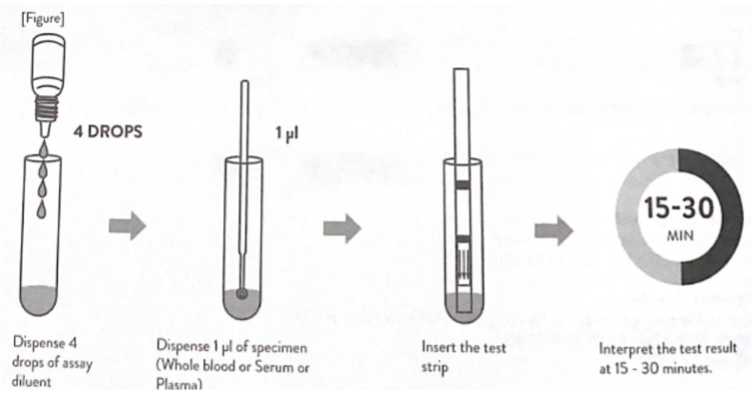
Salmonella typhi IgG/IgM Fast test
a solid phase immunochromatographic assay for the rapid, qualitative & differential detection of IgG & IgM antibodies to Salmonella typhi in human serum, plasma, whole blood.
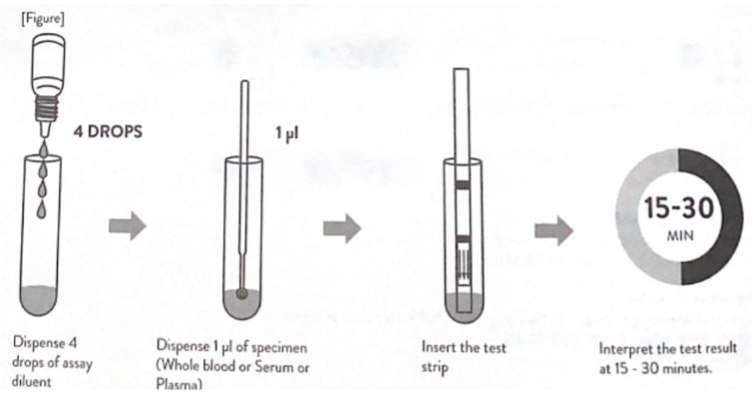
T
Salmonella typhi IgG/IgM Fast test provides ONLY A PRELIMINARY RESULT. Therefore more specific alternative diagnosis method must be used in order to obtain a confirmation of Salmonella typhi infection. (t/f)
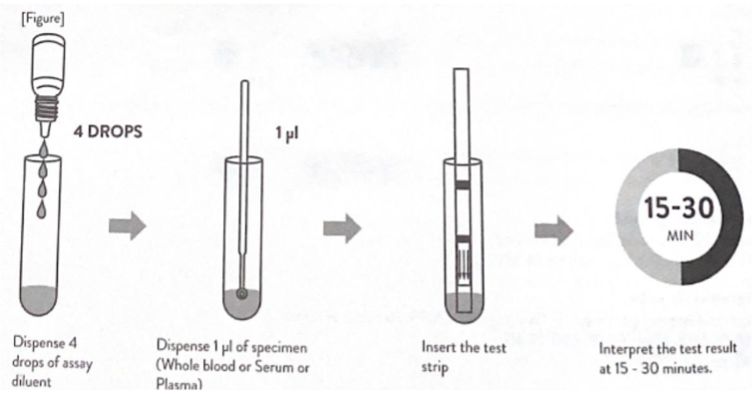
15-30°C
Salmonella Typhi IgG / IgM Fast Test Procedure
1. Allow all kit components & specimen to come to room temperature (-) prior to testing.
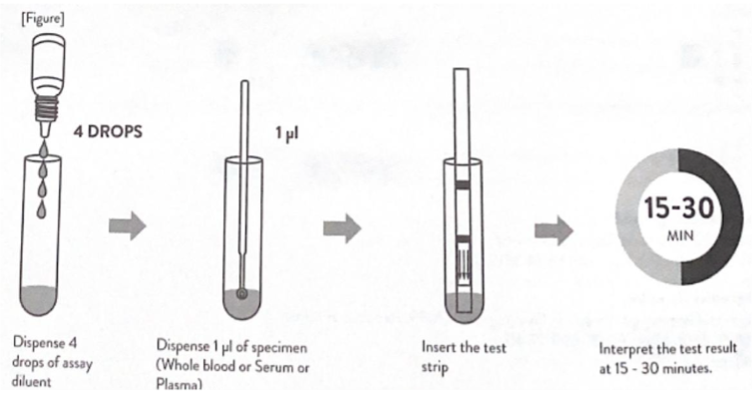
Salmonella Typhi IgG / IgM Fast Test Procedure
2. Dispense 4 drops (about 90-120 uL) of assay diluent to each disposable test tube.
Salmonella Typhi IgG / IgM Fast Test Procedure
2. Dispense - drops (about - uL) of assay diluent to each disposable test tube.
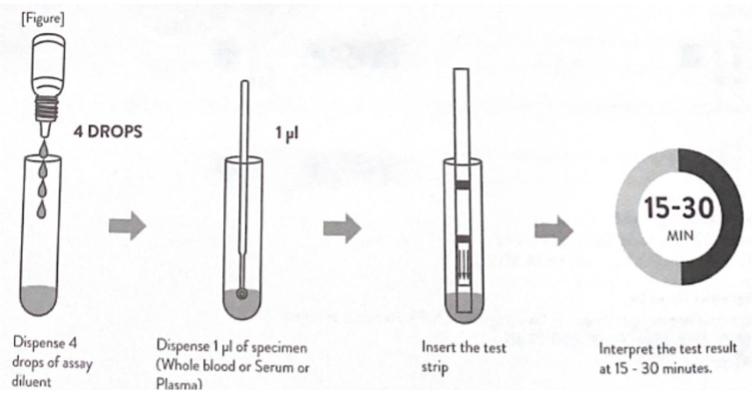
3. With a loop provided dispense 1ul of specimen loop to test tube containing assay diluent.
(dip the circular end of the specimen loop into the specimen, & then carefully place the circular end of the loop into the test tube. This will add 1ul of OF SPECIMEN TO ASSAY BUFFER)
Salmonella Typhi IgG / IgM Fast Test Procedure
3. With a loop provided dispense -ul of specimen loop to test tube containing assay diluent.
(dip the circular end of the specimen loop into the specimen, & then carefully place the circular end of the loop into the test tube. This will add -ul of OF SPECIMEN TO ASSAY BUFFER)
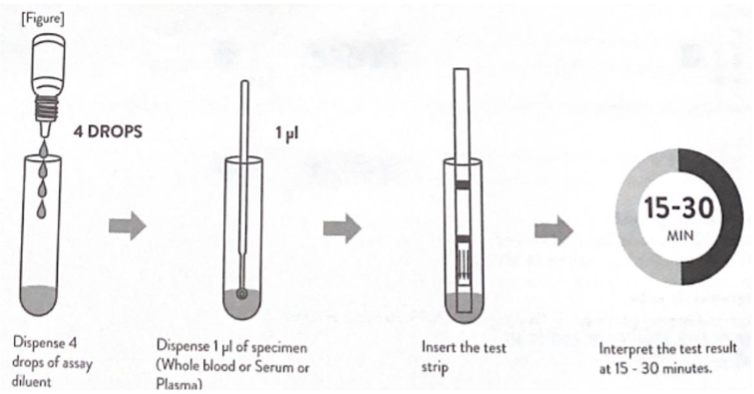
T
Salmonella Typhi IgG / IgM Fast Test Procedure (t/f)
4. Gently stir the assay buffer with the loop to ensure adequate mixing of the specimen in the assay buffer & remove the loop.
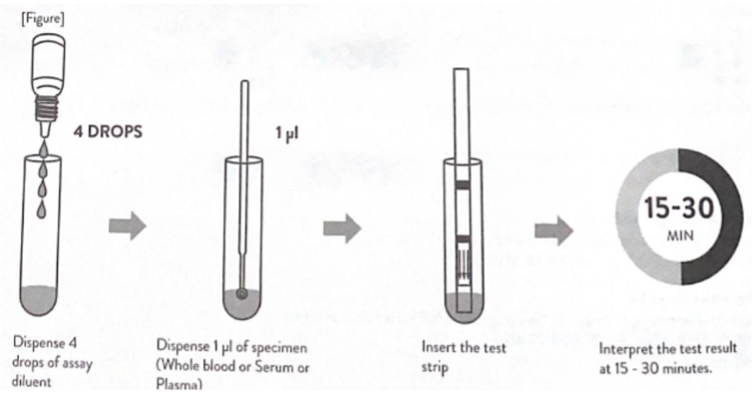
T
Salmonella Typhi IgG / IgM Fast Test Procedure(t/f)
5. Remove the test strip from the foil pouch.
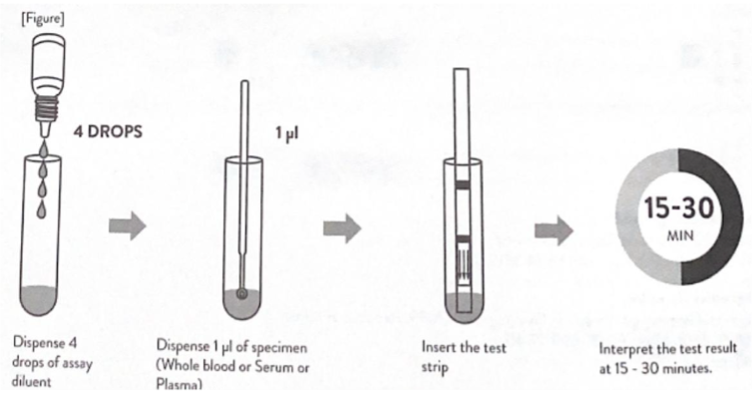
F
6. Holding the strip vertically, insert the test strip into the tube containing diluted specimen.
Salmonella Typhi IgG / IgM Fast Test Procedure (t/f)
6. Holding the strip horizontally, insert the test strip into the tube containing diluted specimen.
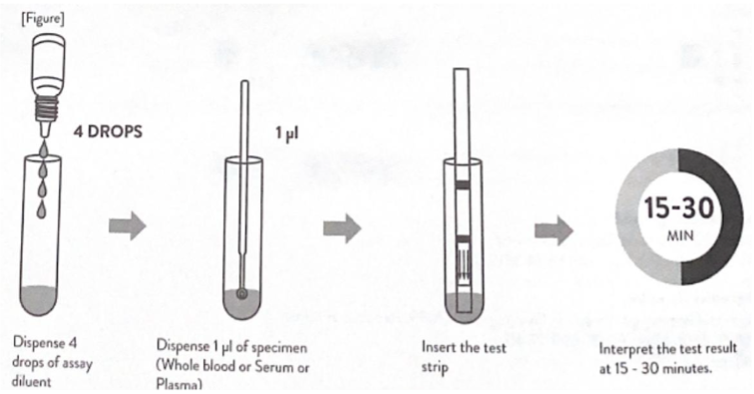
7. Interpret test results at 15–30 minutes. If the test band is very faint at 15 minutes, please read the results again at 30 minutes.
Salmonella Typhi IgG / IgM Fast Test Procedure
7. Interpret test results at - minutes. If the test band is very faint at 15 minutes, please read the results again at 30 minutes.
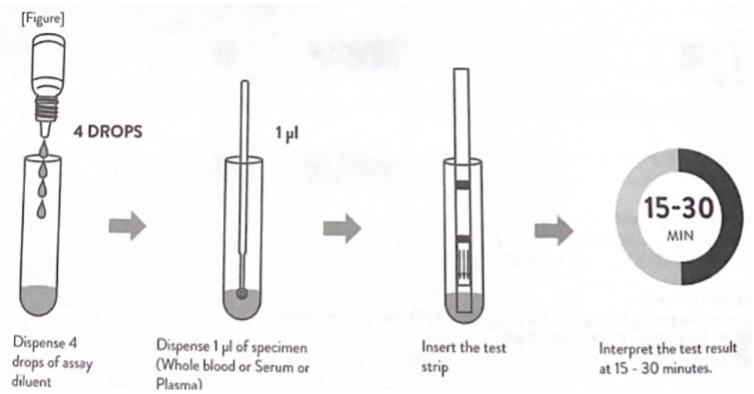
7. Interpret test results at 15–30 minutes. If the test band is very faint at 15 minutes, please read the results again at 30 minutes.
Salmonella Typhi IgG / IgM Fast Test Procedure
7. Interpret test results at 15–30 minutes. If the test band is very faint at 15 minutes, please read the results again at - minutes.
IgG +
Test interpretation of Salmonella Typhi IgG / IgM Fast
Control line(C) & IgG line(G) are visible on the test strip. This is _. This is indicative of previous Salmonella typhi infection (in which case current fever may not due to typhoid) or relapse or reinfection.
Test interpretation of Salmonella Typhi IgG / IgM Fast
IgM +
Test interpretation of Salmonella Typhi IgG / IgM Fast
The control line(C) & the IgM line (M) are visible on the strip. This is _ to Salmonella typhi.
IgM +
Test interpretation of Salmonella Typhi IgG / IgM Fast
This is indicative of acute typhoid fever.
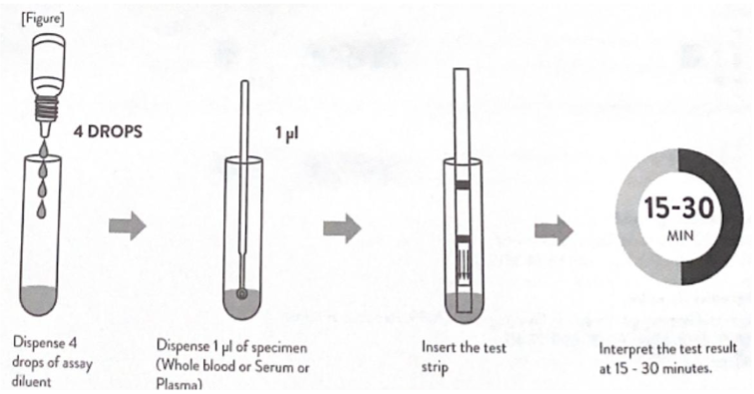
IgG & IgM +
Test interpretation of Salmonella Typhi IgG / IgM Fast
The control line(C), IgM line (M) & IgG line (G) are visible on the strip. This is _
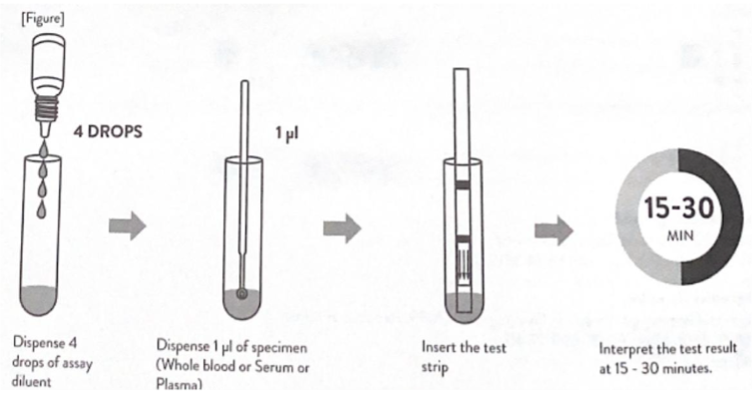
IgG & IgM +
Test interpretation of Salmonella Typhi IgG / IgM Fast
This is indicative of acute typhoid fever (in the middle stage of Salmonella typhi infection).
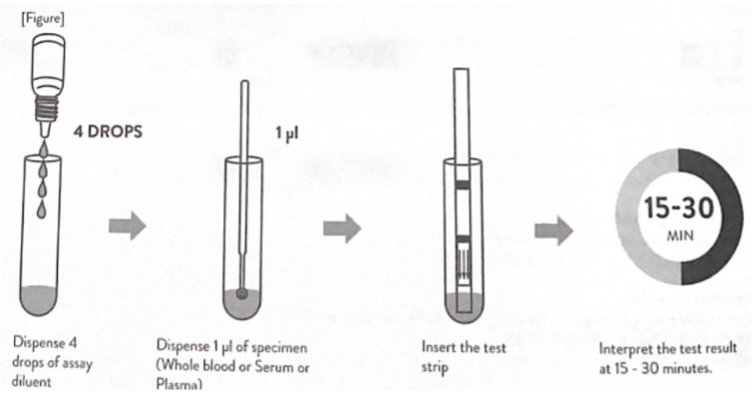
IgG & IgM + is indicative of acute typhoid fever (in the middle stage of Salmonella typhi infection).
Test interpretation of Salmonella Typhi IgG / IgM Fast
IgG & IgM + is indicative of acute typhoid fever (in the - stage of Salmonella typhi infection).
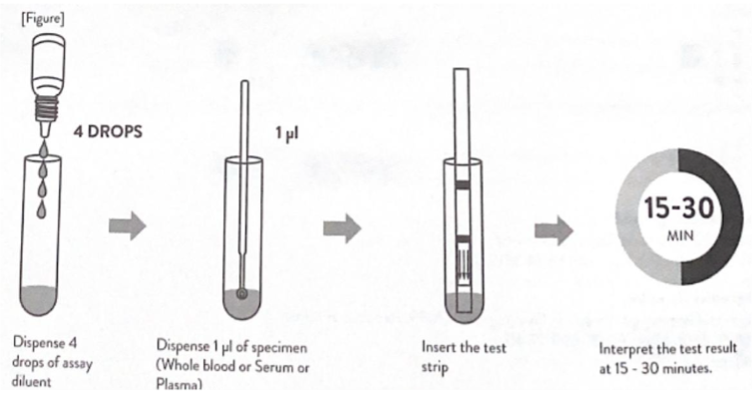
Invalid
Test interpretation of Salmonella Typhi IgG / IgM Fast
The control line(C) fails to appear. The directions may not have been followed correctly or the test may have deteriorated.
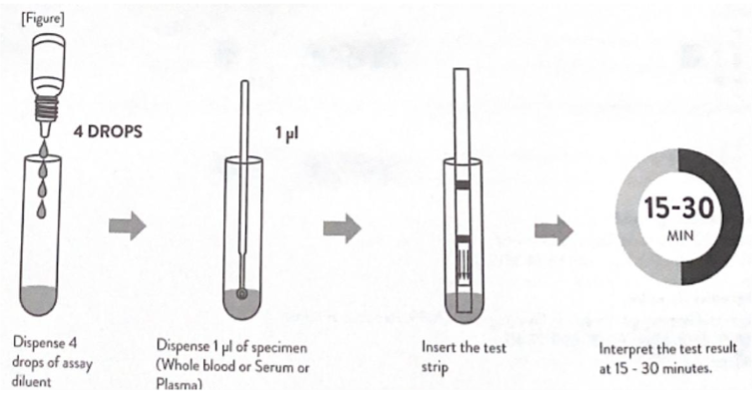
re-tested
Test interpretation of Salmonella Typhi IgG / IgM Fast
Invalid result is recommended that the specimen be - .
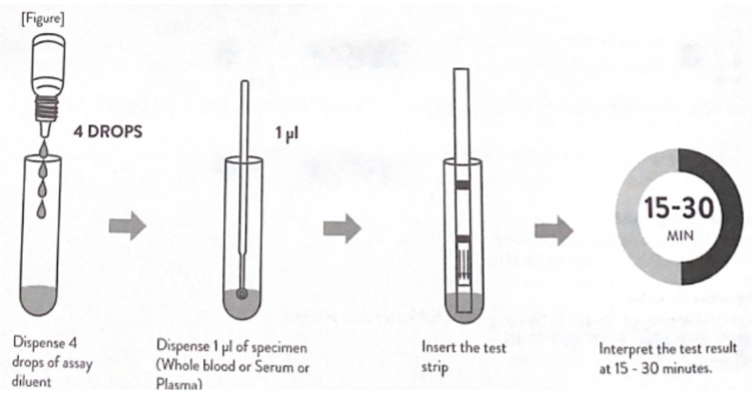
–
Test interpretation of Salmonella Typhi IgG / IgM Fast
The control line is only visible on the test strip. No IgG & IgM antibodies were detected.
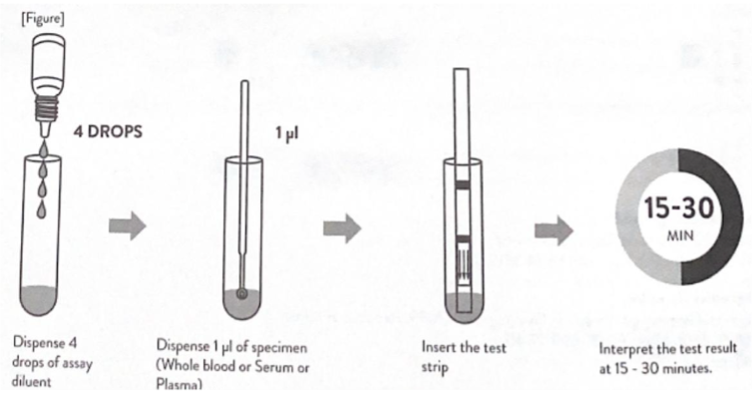
–
Test interpretation of Salmonella Typhi IgG / IgM Fast
Probably not typhoid.